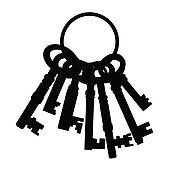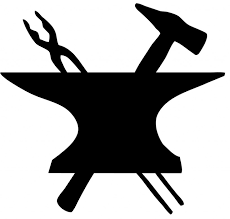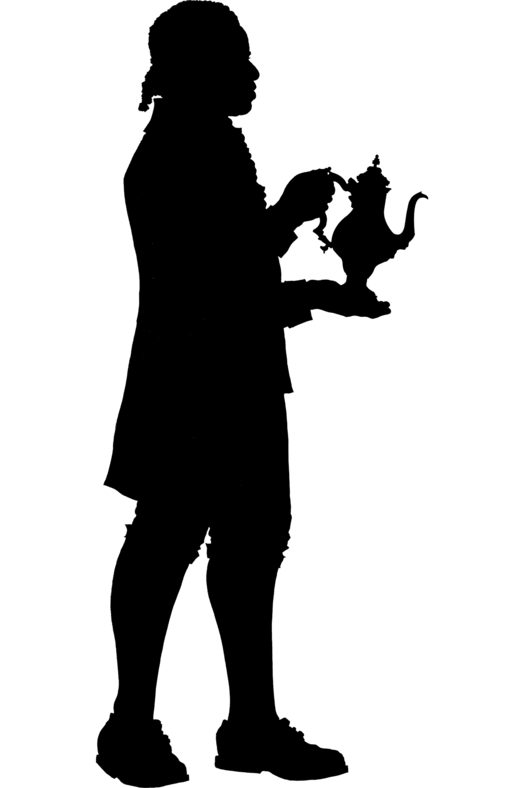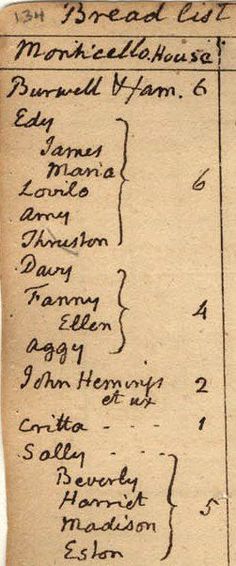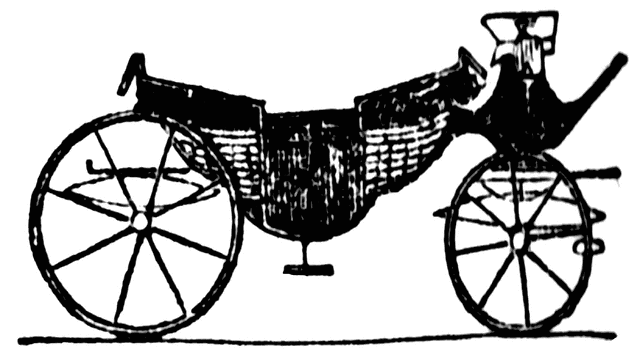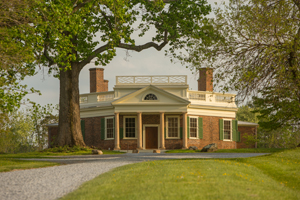SoulsinMyFamily.org
January, 1827
Burwell Colbert waited in the cold for the auction to begin. Today he hoped to make some important purchases. The estate of Thomas Jefferson,the master Burwell had served all of his life, was to be sold at auction.
Although a slave, Burwell had saved some money over the years. Mr. Jefferson had awarded him (and John Hemings, the carpenter) a gratuity, as he wrote in his Memorandum Book. Usually ten dollars, sometimes twenty dollars, given as an "encouragement" for extra good work and dedication to the job.
"Feb.12. Gave Burwell gratuity 10.D. John Hemings do.20D. (1)
Burwell Colbert served as the butler at Monticello through the years of Mr. Jefferson's retirement (1809-1826). His position was the highest in the household. He was also a skilled house painter and glazier.
Encouragements for Work Well Done
Burwell's Family
According to the Farm Book, Burwell was born at Monticello in 1783, the son of Betty Brown .His father is unknown. He was also the grandson of Betty Hemings, the matriarch of a large slave family at Monticello. Burwell had at least three brothers - Wormley, Brown, and Edwin and one sister, Melinda.
At some point he married Critta, his first cousin. Together they had several children, but little is known about Burwell's family. Critta was owned by Thomas Mann Randolph, Mr. Jefferson's son in law. She and her children lived at Edgehill, the Randolph plantation a few miles from Monticello. Burwell and Critta's children would become the property of Mr. Randolph, since a slave woman's owner also owned her children.
Like many young slave boys at Monticello, Burwell started his working life as a nail boy in Mr. Jefferson's nail factory. At age ten, he would work at the anvil, hammering nail rod into nails of all sizes. The job was hot and hard physical work.
According to Mr. Jefferson's chart of wasted nail rod, Burwell (when one of the youngest boys) was wasting a large amount of the expensive nail rod - clearly this was not the job for Burwell! His talents lay elsewhere...and he was to find a place inside the house, when he and some of the other boys were assigned duties in the dining room.
Nail chart Farm Book page 111, 1794.(2)
Thomas Mann Randolph mentioned details about the work in the nailery when he wrote this postscript to Mr. Jefferson in 1801:
"Every thing goes on well at Mont'o. - the Nailers all returned to work & executing well some heavy orders...Moses, Jam Hubbard Davy & Shephard still out & to remain till you order otherwise - Joe cuting nails - I had given a charge of lenity respecting all: Burwell absolutely excepted from the whip alltogether) before you wrote: none have incurred it but the small ones for truancy & yet the work proceeds better than since George. such is the sound sense cleverness & energy of Lillie." (3)
By 1810, Burwell at age 27, was listed first in Mr. Jefferson's Roll of Negroes, recorded in the Farm Book, under the listing "Monticello" and "House". This list indicates he was a house slave, not a tradesman or farm laborer.
Farm Book, page 128 (4)
From the Nailery to the Big House
Butler Duties and much more...
As butler, Burwell was in charge of the keys for the household - a trusted and valuable position on any plantation. Whether it was the wine cellar, the food stores, or the ice house, pretty much every room had a lock and Burwell's access to the valuables reflects his honesty and dependability.
Mr. Bacon, the overseer, mentioned Burwell's responsibilities when Mr. Jefferson served as President and was away from home:
"...I would send the keys to Burwell, and he would air the house, and was, if possible, more particular than I was. He stayed at Monticello and took charge of the meat house, garden, &., and kept the premises in order. Mr. Jefferson gave him his freedom in his will, and it was right that he should do it." (5)
Trouble with Mr. Bankhead
Mr. Bacon also mentioned an incident involving Burwell and Charles Bankhead, the husband of Anne Cary Randolph Bankhead. Anne was Mr. Jefferson's oldest grandchild.
"One night he [Mr. Bankhead] was very drunk and made a great disturbance, because Burwell, who kept the keys, would not give him any more brandy." (6)
Burwell at Poplar Forest
Burwell's closeness to the Jefferson family made him a frequent subject in the news of family letters. Sometimes the news was happy and even comical such as this letter from granddaughter Ellen while staying at Poplar Forest with her Grandpapa.
Mr. Jefferson, ever interested in new "conveniences", had invested in a new contraption known as a "refrigerator." Burwell was at Poplar Forest but because he was sick the girls were taking turns as butler. Ellen wrote to her mother:
"Whilst Israel Cornelia and myself were butlers; Grand papa insisted on our using that cooler, (refrigerator, I believe he calls it,) which wasted our small stock of ice, and gave us butter that run about the plate so that we could scarcely catch it, and wine above blood - heat - but on Burwell's recovery, he soon scouted it, (to use Aunt M's favorite expression) and we have been quite comfortable ever since." (7)
Note: In 1802, President Jefferson was invited to a demonstration of a new invention - a refrigeratory. He made a sketch of it on his invitation - an oval wooden box, with an inner box of tin (which held the butter to be cooled). Ice was placed between the containers and the whole thing was covered in animal furs. Most likely this was the "refrigerator" Ellen mentioned.
Sickness at the Forest
At least once that summer, letters between family members brought very bad news.. Ellen wrote to her mother of Burwell's serious illness that same summer at Poplar Forest:
"...I lost many hours from real anxiety...for the life of a servant so faithfull, so attached and so usefull to my dear Grandfather,...I never saw anybody more uneasy then Grandpapa, and his constant anxiety by convincing me still more of his extraordinary value for Burwell." (9)
Sister Cornelia also wrote home to their other sister Virginia with additional details about Burwell's illness and cure:
"...Burwell's illness whose life was save'd evidently by a bleeding. every remedy had been tried without effect to give him relief till at last it was found necessary to bleed him to prevent inflamation, this they did untill he was near fainting & that produc'd the desired effect...Daddy [Johnny Hemings] who nursed him constantly with the greatest care and attention gave him a warm bath which I suppose relieve'd him from the same cause that the bleeding did that it weakened him so much that it made the spasm give way..." ( 10)
Ellen also wrote to her mother of the lack of medical information that she, Cornelia and Grandpapa possessed in trying to treat Burwell's illness:
"Grandpapa Cornelia and myself make as complete a trio of ignoram{us}es as I do know. and I do not believe our three heads combined contain as much medical knowledge as would save a sparrow." (11)
The Worst of News
Burwell recovered from his sickness, only to receive the worst of news. His wife Critta had died at age thirty six, leaving their eight children motherless. Ellen wrote:
"Burwell as you may suppose is overwhelmed with grief, I have not seen him since he heard the news which was last night. but although h[e] did not shew himself, he came out early in the morning and did all his business as usual. he did not lay by and send us the keys as I expected he would, and I am very glad of it for the want of employment would only leave him more time for the indulgence of his grief, which is so sincere as to excite the greatest degree of sympathy." (12)
Dispersal of Critta's Children
Burwell and Critta's children were owned by Thomas Mann Randolph, Critta's owner. After her death , the Randolph ladies had a discussion in their letters about how to "disperse" of her children. Ellen wrote from Poplar Forest to her sister Virginia who was back home:
"I was very much distressed at hearing of poor Critty's death, for independant of the shock to Burwell, I cannot forget that she was my nurse for a good many years...I shall miss her figure and voice i those places I have been used to see & her them... I have been recollecting that some time ago, when I was lamenting very seriously that I had not secured one of her elder children Mama promised I should have any one of them not disposed of...I am more than ever anxious to have it in my power to befriend, and educate as well as I can, one of these children, and if I remember right Martha is a little sprightly black-eyed girl, whom I have often noticed with pleasure. I think her poor mother would have liked this disposition of her, for I believe she preferred me to the rest of the family." (13)
Why wasn't Burwell sent home when Critta died?
Did Burwell have any say in what happened to his children?
Who took care of his younger children when their mother died?
Did the word "dispose" have the same meaning in the 18th century?
Main Principal Servant on the Place
Burwell managed to earn the praise of Edmund Bacon, the overseer. In his memoirs Mr. Bacon mentioned:
" Mr. Jefferson had a large number of favorite servants that were treated just as well as could be. Burwell was the main, principal servant on the place... He told me not to be at all particular with him - to let him do pretty much as he pleased, and to let him have pocket money occasionally, as he wanted it." (14)
In addition to his butler duties, Burwell was also trained as a house painter and glazier. Mr. Jefferson put his skills to use at Monticello and Poplar Forest.
Mr.Bacon mentioned:
"And Burwell was a fine painter. He painted the carriage (Mr. Jefferson's landau) and always kept the house painted. He painted a good deal at the University." (15)
Saying Goodbye to Ol' Master
As Mr. Jefferson's personal servant, Burwell was present on July 4, 1826, the day his master died. His grandson, Thomas Jefferson Randolph later wrote about the last hours of his grandfathers life...
"About 10 he fixed his eyes intently upon me, indicating some want which most painfully, I could not understand, until his attached servant, Burwell
observed that his head was not so much elevated as he desired it." (16)
Burwell, always the attentive servant, was there to help his master through his final hours by the simple task of raising his pillow.
Reward for Lifelong Service
In recognition of Burwell Colbert's lifelong service, Thomas Jefferson chose him as one of only five slaves freed in his will. The will stated:
"I give to my good, affectionate and faithful servant, Burwell, his freedom, and the sum of three hundred dollars to buy necessaries to commence his trade of painter and glazier, or to use otherwise, as he pleases."(17)
Mr. Jefferson also directed:
"...and it is my will that a comfortable log house be built for each of the three servants (Burwell, Joe Fossett, and John Hemings) so emancipated, on some part of my lands convenient to them with respect to the residence of their wives, and to Charlottesville, and the University, where they will be mostly employed." (18)
The Estate Auction
So when Burwell attended the auction that winter day in 1827, he was a free man - skilled in a trade to support himself and in possession of some amount of money due to his "encouragements" from Mr. Jefferson.
His purchases included a mule ($31) to plow his land, a carving knife (fifty cents), tea china ($4) and a print of Thomas Jefferson ($5.50) that he could display in his new home. (19)
Why was being in charge of the household keys considered such an important responsibility?
Which rooms in the house and outbuildings on a plantation would need to be locked? Why?
Sources
(1) Memorandum Book, February 12, 1824, Founders Online.
(2) Farm Book Nail Chart, page 111.
(3) Martha Jefferson Randolph to Thomas Jefferson, January 31, 1801, Founders Online.
(4) Farm Book, page 128.
(5) Jefferson at Monticello: The Private Life of Thomas Jefferson,Bear,page 99.
(6) Ibid, page 94.
(7) Ellen Randolph to Martha Jefferson Randolph, August 24, 1819,Family Letters Project.
(9) Ellen Randolph to Martha Jefferson Randolph, July 28, 1819, Family Letters Project.
(10) Cornelia Randolph to Virginia Randolph, July 28, 1819,Family Letters Project.
(11) Ellen Randolph to Martha Jefferson Randolph, July 28, 1819,Family Letters Project.
(12) Ellen Randolph to Virginia Randolph, August 31, 1819,Family Letters Project.
(13) Ibid.
(14) Jefferson at Monticello: The Private Life of Thomas Jefferson, Bear, page 99.
(15) Ibid, page 102.
(16)Randall, Thomas Jefferson Randolph to Henry S. Randall, Life of Thomas Jefferson, Volume 3, page 671.
(17) Randall, Volume 3, Appendix 33, pages 665-7.
(18) Ibid.
(19) Free Some Day, Staunton, January 1827 Sale, page 143.
Queries
Queries
A Landau
Burwell Colbert
"The Main Principal
Servant on the Place"
